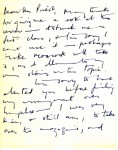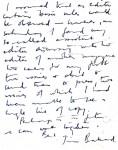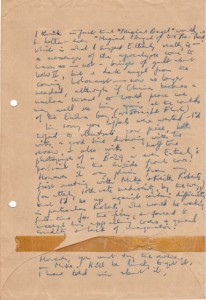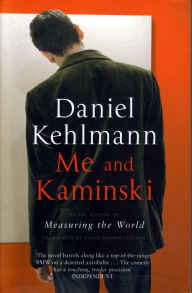 Me and Kaminski was first published in Germany in 2003; it was not translated into English until 2008, and this is the paperback edition. Kehlmann is admirably going about proving that Germans have a light and infectious sense of humour, thus overturning the usual lazy British generalizations about Germans. This is not slipstream in the way that Fame (below) was slip, but it has much the same unexpected quality to its writing. The story, such as it is, deals with the attempts of Sebastian Zöllner, a young art critic (who is cunning and determined, but pretty hopeless on, er, art and almost everything else), to meet and interview and eventually write a biography of an equally cunning but famous and eccentric elderly painter called Manuel Kaminski. Up against it from the start, Zöllner, who is rather like a character from a Kingsley Amis novel, becomes increasingly ruthless and more and more unlikely to get his story. Part social comedy, part road novel, Me and Kaminski is not a great or serious work of literature, but it is endlessly entertaining, well written and in its own way highly original. Increasingly, it is ‘foreign language’ writers like Kehlmann, Roberto Bolaño and Emmanuel Carrère who are bringing home the truth, until now apparent to many people who care about serious fiction, but not alas to everyone, that English-language literary drudges like Ian McEwan, Hanif Kureishi, Pat Barker and Julian Barnes have been creatively dead for about three decades.
Me and Kaminski was first published in Germany in 2003; it was not translated into English until 2008, and this is the paperback edition. Kehlmann is admirably going about proving that Germans have a light and infectious sense of humour, thus overturning the usual lazy British generalizations about Germans. This is not slipstream in the way that Fame (below) was slip, but it has much the same unexpected quality to its writing. The story, such as it is, deals with the attempts of Sebastian Zöllner, a young art critic (who is cunning and determined, but pretty hopeless on, er, art and almost everything else), to meet and interview and eventually write a biography of an equally cunning but famous and eccentric elderly painter called Manuel Kaminski. Up against it from the start, Zöllner, who is rather like a character from a Kingsley Amis novel, becomes increasingly ruthless and more and more unlikely to get his story. Part social comedy, part road novel, Me and Kaminski is not a great or serious work of literature, but it is endlessly entertaining, well written and in its own way highly original. Increasingly, it is ‘foreign language’ writers like Kehlmann, Roberto Bolaño and Emmanuel Carrère who are bringing home the truth, until now apparent to many people who care about serious fiction, but not alas to everyone, that English-language literary drudges like Ian McEwan, Hanif Kureishi, Pat Barker and Julian Barnes have been creatively dead for about three decades.
Author: chris
THE SENSE OF AN ENDING – Julian Barnes (2011, Jonathan Cape, £12.99; ISBN: 978-0-224-09415-3)
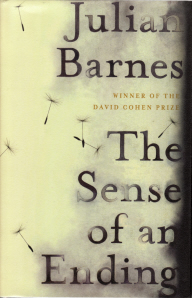 Julian Barnes is an admired writer, respected by literary editors, praised by reviewers and presumably rewarded by a large readership. I don’t get it. I’ve read at least five of his books in the past, and have always been able to admire his ability with English, but all his novels have left me with a feeling of authorial vacuity.
Julian Barnes is an admired writer, respected by literary editors, praised by reviewers and presumably rewarded by a large readership. I don’t get it. I’ve read at least five of his books in the past, and have always been able to admire his ability with English, but all his novels have left me with a feeling of authorial vacuity.
It’s been a while since I read anything of his, so I thought I’d spring for this new one, just out from Cape, and rather attractively packaged in a cover by Suzanne Dean, depicting blown dandelion seeds. Within a few pages of the start, the author’s bland and insipid manner swept over me: I felt I was trapped in a corner of a room by a well-spoken and endlessly polite English nonentity, who wanted to tell me of his many conventional insights into the human psyche. I listened with equal English politeness, waiting for the moment of irony, self-awareness, or even originality that would justify this deadening approach. I waited in vain. It’s not that his subject is uninteresting: the mysteries of relationships, the loss of love, the misunderstandings that can drive a space between lovers, the struggle to adapt and become aware — these are all valid subjects for a good novelist, and fecund material for a sensitive writer. That is not Julian Barnes. His literary ability is feeble: the characters he creates are much of a muchness and his narrator is smug, banal and maddeningly dull. Was that the point? I started to think and hope so, but the endless middle-class assumptions and the sound of well-behaved wittering went on and on.
Emmanuel Carrère has written a novel that interestingly is not all that different in subject, but his novel is a masterpiece of originality, it is powerfully written and full of real emotion. I finished the Barnes book believing that although this author is clearly adequately equipped to write a decent novel he is yet to do so. He appears to have nothing to say worth saying. There is some inner failing, a weakness of the will or a lack of seriousness that means he is now unlikely ever to tackle a real novel. The ending can be all too easily sensed.
Rob’s Oak
To Victory Wood, near Whitstable in Kent, to visit the oaken bench and newly planted oak tree to commemorate the life and work of our friend, Rob Holdstock. Rob died unexpectedly at the end of 2009, leaving a gap in the lives of many people, still unfilled.
Victory Wood is a new plantation, situated between two existing areas of natural ancient woodland, Blean Wood and Ellenden Wood, and for the time being most of it is scrubland covered in wild flowers and grasses. It is a fine, high stretch of land. In time it will grow into a mature forest.
 Rob Holdstock is commemorated in two ways: a wooden bench situated on a bluff of land overlooking the Thames Estuary, with a distant view as far as Chatham shipyard to the west and Whitstable to the east. There is a motorway somewhere down there (well hidden), a railway line and out at sea there is a growing forest of a more modern kind: one of the largest marine wind-farms in Europe. And the tree itself is a sapling grown from an acorn of a 500-year-old oak standing in Windsor Great Park.
Rob Holdstock is commemorated in two ways: a wooden bench situated on a bluff of land overlooking the Thames Estuary, with a distant view as far as Chatham shipyard to the west and Whitstable to the east. There is a motorway somewhere down there (well hidden), a railway line and out at sea there is a growing forest of a more modern kind: one of the largest marine wind-farms in Europe. And the tree itself is a sapling grown from an acorn of a 500-year-old oak standing in Windsor Great Park.
 Today a small group of Rob’s friends and family strode along the paths and tracks to have a look at what is in place. Present were: Sarah Biggs, Rob’s partner of many years, and Rob’s younger brother Chris Holdstock — it was Sarah and Chris who did much of the planning and organizing with the Woodland Trust, getting permission to place the bench and to plant the sapling. Also present were Garry and Annette Kilworth, Roy Kettle and Kathleen Mitchell, Chris Evans, Nina Allan and myself.
Today a small group of Rob’s friends and family strode along the paths and tracks to have a look at what is in place. Present were: Sarah Biggs, Rob’s partner of many years, and Rob’s younger brother Chris Holdstock — it was Sarah and Chris who did much of the planning and organizing with the Woodland Trust, getting permission to place the bench and to plant the sapling. Also present were Garry and Annette Kilworth, Roy Kettle and Kathleen Mitchell, Chris Evans, Nina Allan and myself.
It was a great and exhilarating walk in hot summer sunshine — at the end we staggered off to a local pub, dehydrated and covered in burrs, for a long and only slightly reflective late lunch.
 It is a glorious tribute to a great man and a fine writer. There is a link above to the Woodland Trust’s unusually excellent info page about Victory Wood — they don’t (yet) mark Rob’s Oak as a special feature, but the day will doubtless come. The bench is located high on the ridge close to what is identified on the map as “Clay Hill viewpoint”; there is a commemorative metal plate, together with a few lines from one of Rob’s best poems. The oak (which is as yet barely two feet high) is further to the east, close to what will be the perimeter of the new wood. A permanent post identifies it. Both are undoubtedly hard to find without someone to guide you, but I hope to post the OS map references when they become available.** The whole area is well worth a visit. Now, afterwards, I am left with a strange mixed feeling of sadness and joy.
It is a glorious tribute to a great man and a fine writer. There is a link above to the Woodland Trust’s unusually excellent info page about Victory Wood — they don’t (yet) mark Rob’s Oak as a special feature, but the day will doubtless come. The bench is located high on the ridge close to what is identified on the map as “Clay Hill viewpoint”; there is a commemorative metal plate, together with a few lines from one of Rob’s best poems. The oak (which is as yet barely two feet high) is further to the east, close to what will be the perimeter of the new wood. A permanent post identifies it. Both are undoubtedly hard to find without someone to guide you, but I hope to post the OS map references when they become available.** The whole area is well worth a visit. Now, afterwards, I am left with a strange mixed feeling of sadness and joy.
** Here they are. The BENCH is at TR092613. The TREE is at TR095619.
A RUSSIAN NOVEL – Emmanuel Carrère; trans. Linda Coverdale (2010, Serpent’s Tail, £10.99, ISBN: 978-1-84668-085-4)
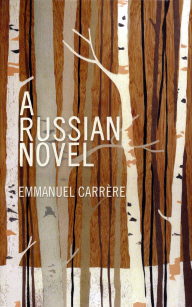 Carrère is one of the best current writers in France. This book, allegedly a novel, but in fact a work of fiction based (apparently) on a great deal of personal experience, is one of the most unusual I have read in a long time.
Carrère is one of the best current writers in France. This book, allegedly a novel, but in fact a work of fiction based (apparently) on a great deal of personal experience, is one of the most unusual I have read in a long time.
The story meanders: a French film crew is in Russia, making a verité film about life in a small and obscure industrial town. The director, or auteur, is Carrère himself, trying to find a film that could be about the drab surroundings or the unpromising characters he meets — these passages appear to be based on real events. As a counterpoint, the Carrère character’s relationship with his partner in France is going through a crisis. At the heart of the book, almost in fact physically in the middle of the novel, is a piece of erotic fiction written in the hope of drawing back his lover. It is an astonishingly original and impressively explicit sequence. My jaded palate, born of boredom with repetitive, unoriginal and in many cases unbelievable sexual antics in fiction, was refreshed by it and eager for more. It is a remarkable piece of writing, certain to become a classic of erotic writing. However, the lead-up to it, and the shocking and agonizing consequences of it, are also pretty impressive.
Like the new novel by Julian Barnes (The Sense of an Ending) much of the book is given over to introspective grappling with feelings of love, loneliness, jealousy, passion, possessiveness, frustration, and all the other experiences around sexual life. Unlike the feeble offering from Mr Barnes, A Russian Novel is a radical, daring and honest work of literature.
Things Update, updated
See Things Update, below. In an earlier post I got the date wrong. The event in Derby at QUAD is on the 14th September, not as shown before. All other details remain the same. Sorry.
(Belated thought: good job I noticed …)
Covered
 Here at last is the final version of the Gollancz cover of The Islanders. The artist is Grady McFerrin.
Here at last is the final version of the Gollancz cover of The Islanders. The artist is Grady McFerrin.
Meanwhile, complimentary copies of ‘hand-crafted’ bookmarks, based on images from the novel, are still obtainable. Any GrimGrin book ordered through this website includes one of the bookmarks. I can’t afford to send out complete sets, but if you write and ask I’ll send you a single card. The series contains some three dozen images in all (not by Grady McFerrin); the images are also collected digitally in the ‘Gallery’, which can be ordered from here. For a single bookmark, free of charge, click on Contact. Don’t forget to include your mail address.
Entry to the event at Foyles on 29th September is free. You have to book through the Foyles website, but that’s all. (See ‘Things Update’ below.) More details will be posted next month.
Things Update
Currently confirmed CP appearances in the near future:
- 14th September – QUAD, Derby. See the QUAD / Creative Boom website for more information. An “Evening with CP”: at 7:00 pm a reading from new novel The Islanders, followed by an introduction to the movie of The Prestige. The film will be shown at 8:45 pm. Tickets for the talk are £5.00; for the talk + movie £10.00
- 27th September; 6:30 pm – Foyles, Charing Cross Road, London. Launch of the anthology House of Fear, published by Solaris. CP has a new story, “Widow’s Weeds”. Free.
- 29th September; 6:30pm – Foyles, Charing Cross Road, London. London launch of The Islanders. Tickets free, obtainable direct from Foyles. (Ignore all references to the Impostor “Green Lantern” Priest.)
- 30th September/1st October – Fantasycon, Royal Albion Hotel, Brighton. CP will be signing copies of the The Islanders. Also, will be interviewing special guest, Brian Aldiss.
- 25th January 2012 – BSFA London Meeting, Upstairs room, The Antelope Tavern, 22 Eaton Place, London SW1W 8EZ. CP interviewed about The Islanders, by Paul Kincaid.
When J. G. Ballard met Keith Roberts
In today’s Guardian G2 supplement, Chris Hall has an article about the opening of the J. G. Ballard archive at the British Library. Fascinating stuff. (For link, see below.) Part of Hall’s argument is that there is little insight in the archive into the man himself: Ballard liked to cover his tracks.
My own archive (which is to say, the pile of dusty old boxes in the loft) contains some Ballard material that does actually afford a glimpse into the great man’s nature. It dates back forty-five years. The background to it is this:
 In 1966 I came across a remaindered copy of a book by William Bradford Huie called The Hiroshima Pilot. This was an account of the life of Claude Eatherly, who claimed (falsely) that he was the pilot of the Superfortress that had dropped the atom bomb on Hiroshima. He later became a kind of symbol of collective guilt for what the West had done to an undefended city. The book explained a few fairly obscure references to Eatherly that had appeared in some of Ballard’s short stories. As an admirer of Ballard’s work I read Huie’s book immediately, and with immense interest. I wrote a long review of it, which after much intensive thought I called “Review of The Hiroshima Pilot”. (I failed to notice what should have been apparent, that The Hiroshima Pilot had been published in hardback two years earlier, and that the paperback edition had been published sufficiently far into the recent past, and without much success, to have made it to a remainder counter. I was late to the Eatherly mythos, but did not realize it until some time afterwards.)
In 1966 I came across a remaindered copy of a book by William Bradford Huie called The Hiroshima Pilot. This was an account of the life of Claude Eatherly, who claimed (falsely) that he was the pilot of the Superfortress that had dropped the atom bomb on Hiroshima. He later became a kind of symbol of collective guilt for what the West had done to an undefended city. The book explained a few fairly obscure references to Eatherly that had appeared in some of Ballard’s short stories. As an admirer of Ballard’s work I read Huie’s book immediately, and with immense interest. I wrote a long review of it, which after much intensive thought I called “Review of The Hiroshima Pilot”. (I failed to notice what should have been apparent, that The Hiroshima Pilot had been published in hardback two years earlier, and that the paperback edition had been published sufficiently far into the recent past, and without much success, to have made it to a remainder counter. I was late to the Eatherly mythos, but did not realize it until some time afterwards.)
Soon after I had completed the review I heard news that I found irresistibly interesting: J. G. Ballard was going to take over the editorship of Impulse magazine. I had sold two of my early stories to Impulse, and wanted and intended to sell more. The news that the writer I considered the best and most original of the day was going to be running it was a fabulous prospect. I submitted the review to him.
Mr Ballard returned it to me a few days later, with a handwritten note. The note is undated, but the postmark on the envelope he used is 7th June 1966. (There is more to learn about the envelope — below!) Here is what the note said:
Dear Mr Priest,
Many thanks for giving me a look at the review — it struck me as first class, & I’m sorry I can’t use it — perhaps Mike Moorcock will take it, as it illuminates my own stories on the topic.
I’m sorry to have alerted you before finalising my arrangement over Impulse — I was very keen, & still am, to take over the magazine, and I assumed that as editor certain basic rules would be observed — however, on Saturday I found my so-called assistant editor discussing with the editor of another magazine the contents for my first two issues & about to send them to press, two issues of which I had been unable to see a single line of copy.
Perhaps in future we can work together.
Best,
Jim Ballard
Naturally, this was a disappointment to me. However, there was the consolation that he had obviously read the article, said he had liked it, and gave an interesting account of why he was returning it to me. But by this time I had already seen the envelope.
Presumably, by writing the note Ballard had intended to vent some of his irritation about the assistant editor (who was in fact the writer Keith Roberts, at that time not widely known but already the author of some excellent short stories, and a fairly good first novel). But instead of calming himself down, Ballard seemed to have made his annoyance greater, because after sealing up my manuscript and his note in the envelope, he scribbled a long afterthought on the outside. I had of course seen this as soon as I picked it up, but the excited handwriting and the unexplained context had not made it plain straight away what was going on. Here is what J. G. Ballard wrote on the back of the envelope:
I think in fact that “Migrant Angel” would be better — even “Migrant Angel of the Pre-Third”, which is what I suspect Eatherly really is — a messenger of the apocalypse come to warn us — not a bringer of guilt about WWII, but a dark angel from the coming holocaust — now no longer needed, although if China becomes a nuclear threat to world peace we may well see him again at the controls of the Enola Gay (or Straight Flush). I’m sorry your efforts were wasted — I’d hoped to illustrate your piece, both with a good line drawing with the review, and also with a half tone photograph of a B-29 or even Eatherly’s portrait in the inside front cover. However it was plain from my first meeting with Mike and Keith Roberts (an utterly 10th rate mediocrity, by the way), that I’d be up against certain difficulties, in particular Roberts, who would be working full-time for the firm, & forced to accept his appalling covers & general crudity & lack of imagination. However, you must try the review on Mike. He’ll be lucky to get it. I have told him about it.
I sent it to Michael Moorcock, but he too rejected it. The review was eventually published (under the title “Migrant Angel”) in the December 1966 edition of Vector. I always thought it would be worth keeping the note from J. G. Ballard, and also the envelope. They are very dusty now, but still intact.
Chris Hall’s article in the Guardian: Relics of a red-hot mind.
FAME – Daniel Kehlmann; trans. Carol Brown Janeway (2010, Quercus, £12.99, ISBN: 978-1-84916-376-7).
 A wonderful example of pure slipstream: innovative, multi-levelled, endlessly amusing, completely original. Kehlmann is a young German writer, currently living in Vienna. This is his third novel. Like all the best slip, Fame more or less defies description, even undermining any attempt to recount the plot. It’s one of those books that as soon as you’ve finished it, your interest has been so piqued by the author’s intrigue that you want to go back and start all over again. And no, it’s completely non-fantastic — everything happens in the here and now, no troublesome fantasy to have to put up with. This is middle Europe in the present day, a world of mobile phones, grumpy authors, assisted suicide, self-fulfilment books and characterless hotels. It is the most enjoyable novel I have read this year. So far.
A wonderful example of pure slipstream: innovative, multi-levelled, endlessly amusing, completely original. Kehlmann is a young German writer, currently living in Vienna. This is his third novel. Like all the best slip, Fame more or less defies description, even undermining any attempt to recount the plot. It’s one of those books that as soon as you’ve finished it, your interest has been so piqued by the author’s intrigue that you want to go back and start all over again. And no, it’s completely non-fantastic — everything happens in the here and now, no troublesome fantasy to have to put up with. This is middle Europe in the present day, a world of mobile phones, grumpy authors, assisted suicide, self-fulfilment books and characterless hotels. It is the most enjoyable novel I have read this year. So far.
THIS WAY FOR THE GAS, LADIES AND GENTLEMEN – Tadeusz Borowski; trans. Barbara Vedder (1976, Penguin Books, £8.99, ISBN: 0-14-018624-7)
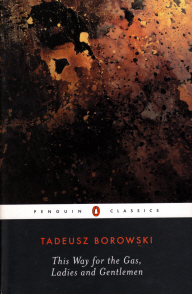 Borowski was born in 1922 in Zhitomir, in Ukraine, to Polish parents. His first book, a collection of poetry, was published in Warsaw in the winter of 1942. A few weeks later he was arrested and sent to Auschwitz. He survived the war, as did his fiancée, also incarcerated in the concentration camp. After the war Borowski joined the Communist Party and worked as a political journalist.
Borowski was born in 1922 in Zhitomir, in Ukraine, to Polish parents. His first book, a collection of poetry, was published in Warsaw in the winter of 1942. A few weeks later he was arrested and sent to Auschwitz. He survived the war, as did his fiancée, also incarcerated in the concentration camp. After the war Borowski joined the Communist Party and worked as a political journalist.
The stories in this book (fiction, but obviously and unquestionably based on direct experience) started appearing in 1946, and were published in two collections in the late 1940s. This Way for the Gas brings all his Auschwitz stories into one volume. Because of these stories, and his poetry, Borowski was almost immediately recognized in Poland as a major literary figure, although most of his output later was political journalism. He committed suicide in 1951, still only 29. It is at times a difficult and shocking book to read because of the content, but it is also undoubtedly a work of literature.
Like all great books it is not at all as your preconceptions might lead you to expect. Many of the events and descriptions come as a surprise, and because of our collective assumptions about life in an extermination camp some of it beggars belief, but Borowski was there. This Penguin edition appears to be the only English-language version presently available, and is published by the US branch of the company. It can be obtained through the internet.
